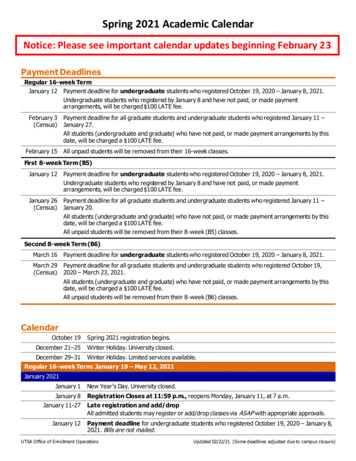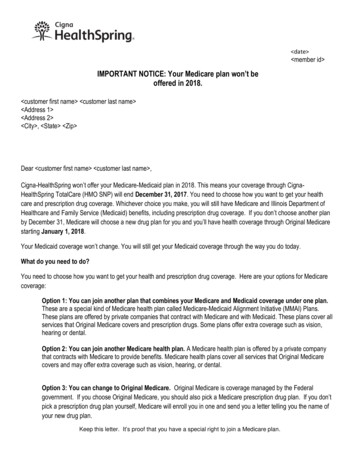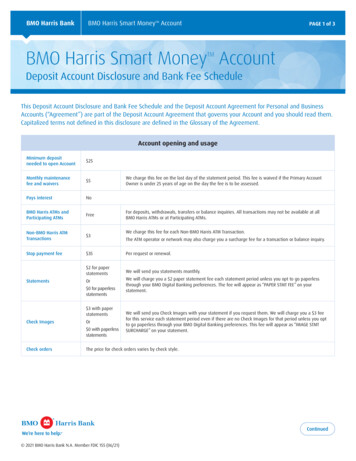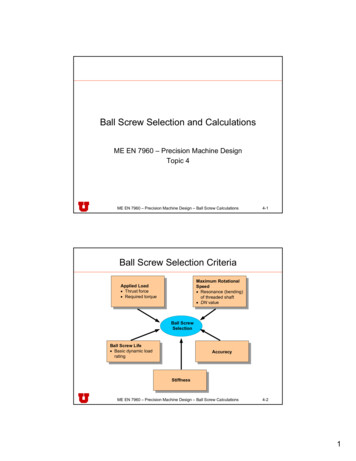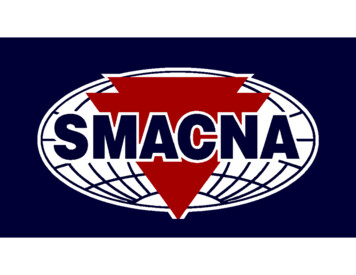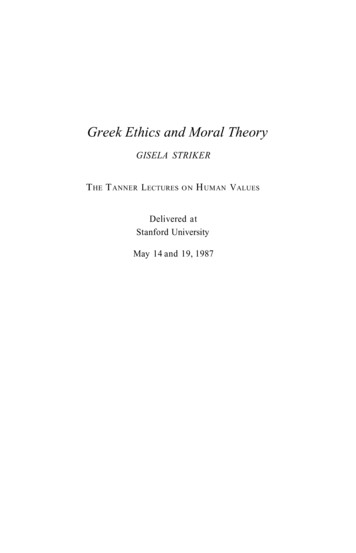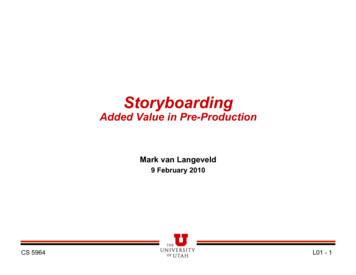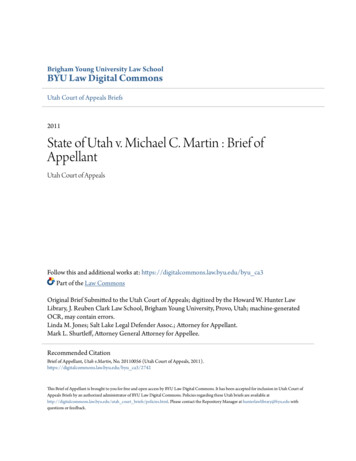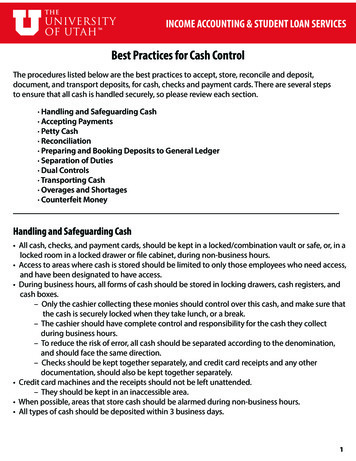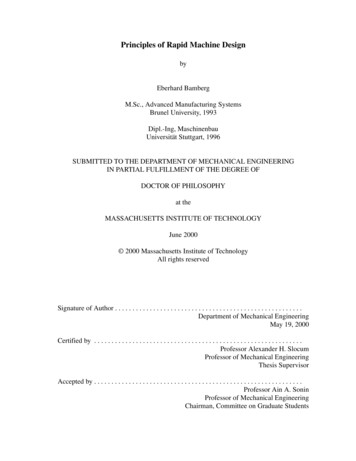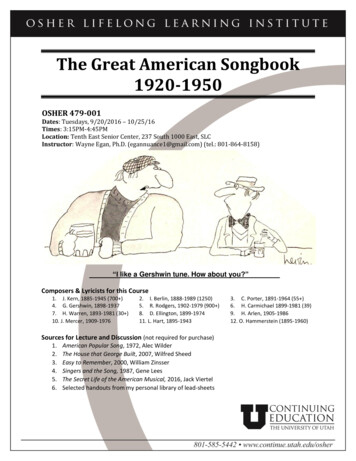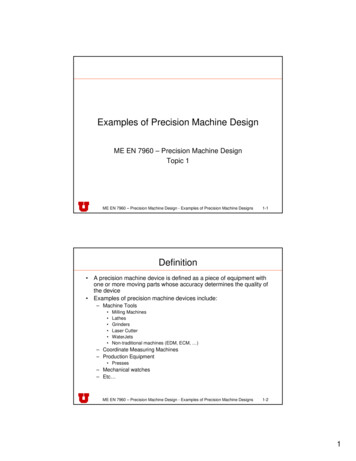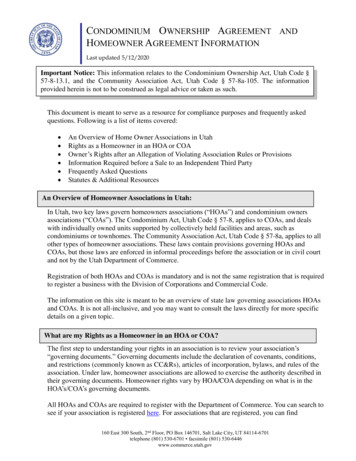
Transcription
CONDOMINIUM OWNERSHIP AGREEMENT ANDHOMEOWNER AGREEMENT INFORMATIONLast updated 5/12/2020Important Notice: This information relates to the Condominium Ownership Act, Utah Code §57-8-13.1, and the Community Association Act, Utah Code § 57-8a-105. The informationprovided herein is not to be construed as legal advice or taken as such.This document is meant to serve as a resource for compliance purposes and frequently askedquestions. Following is a list of items covered: An Overview of Home Owner Associations in UtahRights as a Homeowner in an HOA or COAOwner’s Rights after an Allegation of Violating Association Rules or ProvisionsInformation Required before a Sale to an Independent Third PartyFrequently Asked QuestionsStatutes & Additional ResourcesAn Overview of Homeowner Associations in Utah:In Utah, two key laws govern homeowners associations (“HOAs”) and condominium ownersassociations (“COAs”). The Condominium Act, Utah Code § 57-8, applies to COAs, and dealswith individually owned units supported by collectively held facilities and areas, such ascondominiums or townhomes. The Community Association Act, Utah Code § 57-8a, applies to allother types of homeowner associations. These laws contain provisions governing HOAs andCOAs, but those laws are enforced in informal proceedings before the association or in civil courtand not by the Utah Department of Commerce.Registration of both HOAs and COAs is mandatory and is not the same registration that is requiredto register a business with the Division of Corporations and Commercial Code.The information on this site is meant to be an overview of state law governing associations HOAsand COAs. It is not all-inclusive, and you may want to consult the laws directly for more specificdetails on a given topic.What are my Rights as a Homeowner in an HOA or COA?The first step to understanding your rights in an association is to review your association’s“governing documents.” Governing documents include the declaration of covenants, conditions,and restrictions (commonly known as CC&Rs), articles of incorporation, bylaws, and rules of theassociation. Under law, homeowner associations are allowed to exercise the authority described intheir governing documents. Homeowner rights vary by HOA/COA depending on what is in theHOA’s/COA’s governing documents.All HOAs and COAs are required to register with the Department of Commerce. You can search tosee if your association is registered here. For associations that are registered, you can find160 East 300 South, 2nd Floor, PO Box 146701, Salt Lake City, UT 84114-6701telephone (801) 530-6701 facsimile (801) 530-6446www.commerce.utah.gov
important information about the association including the names and contact information for theHOA’s/COA’s leadership. These individuals have access to your governing documents and mustshare them with you upon request. Utah Code §§ 57-8a-227(1)(a)(ii), 57-8-17(1)(a)(ii). You canalso check with your local county recorder’s office to obtain a copy of the CC&Rs and bylaws.In addition to rights provided under your governing documents, you have rights under state lawunder either the Condominium Act or the Community Association Act, depending on if you live ina COA or any other type of association (HOA). Most of these rights are common to HOAs andCOAs, though some additional rights exist that are specific to COAs and HOAs. Some of aproperty owner’s general rights include: All association rules must be reasonable. Utah Code §§ 57-8a-218(14), 57-8-8.1(6).An owner has the right, subject to some exceptions, to have the association’s rules appliedin a similar way to all owners in the association. Utah Code § 57-8a-218(1).No rule can interfere with the freedom of an owner to determine the composition of theowner’s household, subject to occupancy limits. Utah Code §§ 57-8a-218(5), 57-8-8.1(3).An owner has the right to obtain a statement of payoff fees within five business days of arequest. The association may charge for this, but not more than 50. Utah Code §§ 57-8a106, 57-8-6.3.A unit owner has the right to inspect documents kept by the HOA/COA, subject to costsand some limitations. Utah Code §§ 57-8a-227, 57-8-17.The HOA/COA may not charge more than the actual cost of reviewing and approvingsubmitted plans for construction or improvement of a lot or unit. Utah Code §§ 57-8a-109,57-8a-6.7.The HOA/COA cannot require more than a supermajority (67%) vote of the unit owners toamend the governing documents. Also, the association cannot require that any specificmember give approval before an amendment to those documents. Utah Code §§ 57-8a-104,57-8a-104, 57-8-39.If you own a condominium in a shared structure, you have a right to sell your individualunit as if it were its own independent property. Utah Code § 57-8-4.While HOA/COAs may set restrictions on the number of units that may be rented, it mustallow a unit to be rented if the owner is:1. Currently deployed by the military;2. Renting the unit to a parent, child, or sibling;3. Relocated by the owner’s employer for less than two years;4. A business owned by the unit’s resident; or5. A revocable trust created for the unit’s resident or the resident’s parent, child, orsibling. Utah Code §§ 57-8a-209(2), 57-8-10.1(2).Upon written request, owners have a right to obtain a written statement showing anyunpaid assessment on the owner’s property. Utah Code §§ 57-8a-206, 57-8-54.A reserve fund may be maintained by the HOA or COA to cover costs of repairing,replacing, or restoring common areas (but usually cannot be spent on typical maintenance).Reviews of the need for and the appropriate amount that should be in a reserve fund should2
be conducted every six years. Homeowners have a right to receive a summary or copy ofthe most recent reserve analysis. Utah Code §§ 57-8a-211, 57-8-7.5.The annual budget should include the amount the board or committee determines to setaside each year for the reserve fund. Within 45 days of the adoption of the budget, theowners may hold a special meeting to consider a veto of the amount being put into reserve.Utah Code §§ 57-8a-211(7)(a), 57-8-7.5(7)(a).An owner has the right to enforce their rights pertaining to the reserve fund in court. Butbefore beginning an action, the owner must submit a notice to the association withinformation about the alleged failure to comply. Utah Code §§ 57-8a-211(8), 57-8-8.5(8).Owners in a COA may not be charged a fee greater than 500 a month in aggregate finesfor violations of the same rule or provision of the governing documents. Utah Code § 578-37.Owners in an HOA have the right to display religious and holiday signs, symbols, anddecorations, subject to association rules about time, place, and manner. Utah Code § 57-8a218(3). They also may display political signs, subject to time, place, manner, and designcriteria of the HOA. Utah Code § 57-8a-218(4).An HOA may not set a rule forbidding an activity within the confines of a dwelling or lot ifit is otherwise legal within the confines of a dwelling under local laws and ordinances.Utah Code § 57-8a-218(6).For other HOA specific rights, see Utah Code § 57-8-218.For time-share owners, under Utah Code § 57-8a-102, a time-share condominium unit shallbe entitled to the exclusive ownership and possession of the physical unit that the timeperiod relates and shall be entitled to the use and enjoyment of the common areas andfacilities during the time period unit allowed as said in the declaration.Information Required before a Sale to an Independent Third Party:For condominiums and other properties under an association, under Utah Code §§ 57-8-6.1 and57-8a-105.1, before the sale of any unit or property under a declaration of a COA/HOAassociation, the grantor must provide the independent third party with a copy of the association ofunit owners' recorded governing documents and the link, or document, directing attention to theDepartment of Commerce’s COA/HOA information webpage. This needs to be given by thegrantor before closing. The association must provide this information to the grantor upon request.It does not matter when the association was formed, if there is a COA/HOA in existence, then theassociation must disclose the governing documents to a prospective buyer.Unit Owner Responsibilities under an HOA:As with rights, understanding your responsibilities under an HOA or COA begins with reviewingthe association’s governing documents. As noted above, governing documents include thedeclaration of covenants, conditions, and restrictions (commonly known as CC&Rs), articles ofincorporation, bylaws, and rules of the association. All owners within an HOA or COA arerequired to reasonably comply with their governing documents. Utah Code §§ 57-8a-212.5, 57-88.This means that if your association has a rule, you may have to pay fees or face other legal3
consequences if you do not abide by the rule. Most of your responsibilities will be found within theassociation’s governing documents rather than in the state code.Owners are required to pay monthly and other assessments from the association on time. UtahCode §§ 57-8a-201, 57-8-44(1). Failure to pay fees and assessments as they become due may leadto a termination of utility service, access to and use of recreational facilities, a lien on the propertyor even a non-judicial foreclosure by the COA/HOA.Frequently Asked Questions:a. Who needs to register a HOA/COA with the Department of Commerce?Registration of any HOA/COA is mandatory and is separate from filing a businessregistration with the Division of Corporations and Commercial Code. The registrationrequirements maintain transparency with current and accurate contact information in theevent contact is required for financial and legal matters regarding HOAs.The HOA/COA registration is mandatory and must be current.b. Are there exemptions to HOA/COA registration?There are no exemptions. All condominiums and other community associations must beregistered with current information with the Utah Department of Commerce.c. What information is required for HOA/COA registration?To prepare to register a COA, you will need the following information: The name and address of the COA;The name, address, telephone number, and, if available, email address of theCOA president; The name and address of each management committee member; and The contact information (name, address, telephone number, and if desired,email or fax) of the individual at the COA who will be the contact for payoffinformation.To prepare to register an HOA or other type of community association, you willneed the following information: The name and address of the association;The name, address, telephone number, and if available, email address of thechair of the association’s board;Contact information for the association’s manager;4
The contact information (name, address, telephone number, and if desired,email or fax) of the individual at the association who will be the contact forpayoff information.d. What are the fees relating to HOA registration?The initial registration is 37 under both the Condominium Ownership Act and theCommunity Association Act under Utah Code §§ 57-8a-105, 57-8-13.1. Any amendmentwill require a 10 fee.e. What are the penalties for noncompliance with the HOA registration?Penalties for noncompliance for HOA/COA registrations for condominiums may includenot allowing pursuing or enforcing a lien, under Utah Code § 57-8-13.1(5). In simpleterms, this means you may not be able to pursue a claim against a unit owner that owes theassociation fees. Similar provisions apply for noncompliance to other communityassociations under Utah Code § 57-8a-105(5).f. How do I start an HOA/COA?Drafting declarations and bylaws, as well as the process for initiating and managing a newCOA/HOA are complex processes. Obtaining the advice of a licensed attorney is highlyrecommended before attempting to create an HOA or COA.The defining event in the creation of a condominium project is filing the declaration ofcovenants, conditions, and restrictions (CC&Rs) and other deed instruments with thecounty recorder. Sometimes, a declaration is referred to as a "master deed." Condominiumdeclarations are covenants running with the land. The Utah Condominium Act, Utah Code§ 57-8 et seq., sets out certain information that a declaration must contain and thedeclaration may also contain any other matters the declarant considers appropriate. Platsand plans are a part of the declaration, and are required for all common interestcommunities. Each plat must show or project certain specified information. A declarationof condominium operates as a contract among unit owners and the association, spelling outthe mutual rights and obligations of the parties. However, nothing requires that allrestrictions on use must be identified in a condominium's declaration.With condominiums, a developer is subject to the act upon signing and recording adeclaration. When signing the declaration, a developer must also submit a "recording of theplat" and a set of preliminary bylaws for the project. These documents are to be recordedwith the county recorder as well as in an index containing all information regardingcondominium projects in the county. Neither the declaration nor any amendments to it arevalid until recorded in the proper manner.5
The creation of other community associations follows a similar process. Communitymembers agree to covenants, conditions, and restrictions and these will run with the land.The purposes for community associations may be for shared up-keep fees, facilities that areused in common, or solar energy systems under Utah Code § 57-8a-701.g. How is a HOA/COA dissolved?There are many legal considerations for the dissolution of an HOA or COA that should betaken into consideration, and obtaining the advice of a licensed attorney is highlyrecommended before attempting to dissolve an HOA or COA. The dissolution process isdone with Utah Division of Corporations following this general process: Under Utah Code § 16-6a et seq., HOAs/COAs that are registered nonprofitcorporations may be dissolved following Utah Code § 16-1 et seq.This is done by a proposal from the members to the HOAs/COAs associationboards for adoption.Next, to dissolve a corporation in Utah, a completed form of the Articles ofDissolution must be filed with the Utah Division of Corporations & CommercialCode along with the filing fee. Processing time may take a week or more.Then, once the statement of dissolution is given, it may be used to further processthe winding up such as closing bank accounts and filing forms to close Utah taxaccounts or with the IRS to close the employment identification number.h. Where do I find a copy of the declaration of covenants, conditions, and restrictions(“CC&Rs”)?Your HOA/COA is required to keep a copy of your CC&Rs and other governingdocuments and make them available to you on request. Note that your HOA/COA maycharge for copies of the document, especially for physical copies. You can also findCC&Rs in local recording offices for the development. Note that CC&Rs may besubsequently amended and remain fully enforceable.The HOA/COA registry at the Utah Department of Commerce does not keep records of theCC&Rs or HOA/COA declarations.Statutes:The Condominium Ownership Act § 57-8 et seq. may be found .htmlThe Community Ownership Act § 57-8a et seq. may be found 8a.html6
Related Information:For information regarding Utah Domestic Non-Profit Corporations, please visit the UtahDepartment of Commerce, Division of Corporations’ Business Entities page mlFor information regarding Timeshares, please visit the Utah Department of Commerce, Division ofReal Estate’s Timeshares page ml7
NOTICE OF DISCLAIMERTHIS INFORMATION IS MADE AVAILABLE AS A FREE PUBLIC SERVICE WITHOUTANY EXPRESS OR IMPLIED WARRANTIES, AND IS SUBJECT TO THE FOLLOWINGDISCLAIMERS:1. ACCURACY. The State makes no guarantee of the completeness or accuracy of thisinformation. The State makes no promise or warranty to maintain or update the information.The user assumes the risk of verifying materials.2. NO WARRANTIES. In providing this information, the State makes no express or impliedwarranty, and does not assume any responsibility for the information’s accuracy, completeness,currency, or use for any purpose.3. COPYRIGHT LIMITATIONS. The State has made this information available to public andanyone may copy or distribute this material without obligation to the State. However, the Statedoes not guarantee that this information is free of Copyright claims or other restrictions of thefree use or display.8
share them with you upon request. Utah Code §§ 57-8a-227(1)(a)(ii), 57-8-17(1)(a)(ii). You can also check with your local county recorder’s office to obtain a copy of the CC&Rs and bylaws. In addition to rights provided under
